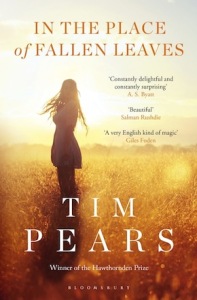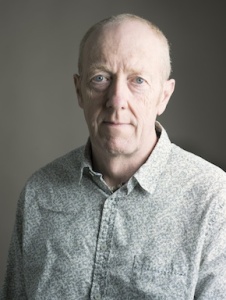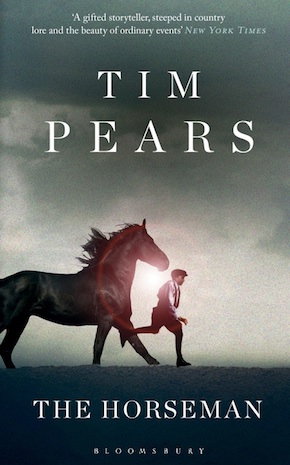Keeping it pastoral
by Tim PearsTim Pears’ spellbinding new novel The Horseman tells the story of a touching, unexpected friendship between a carter’s son and a landowner’s daughter. It’s the first book in a planned trilogy that begins in a remote valley on the Devon–Somerset border in the early years of the twentieth century. He fills us in on his writing and reading habits.
Where are you now?
At my father’s old desk in my study in our house on Banbury Road, a map of the West Country and a framed photo by Josef Koudelka on the wall to my left, traffic through the window to my right. (My wife just emailed me a link to an article suggesting that the risk of dementia is increased living next to a busy road, so forgive me if this questionnaire gets a bit confused.)
Where and when do you do most of your writing?
I move around the house and write in bed, in the kitchen, seeking the right spot, it’s idiotic. As for hours, I write 9-5 ish, like the clerk I wish I wasn’t.
If you have one, what is your pre-writing ritual?
Walk the dog.
Full-time or part-time?
When I began this trilogy, my wife said, “Give up the tutoring work, go for it, we can manage.” She somehow understood that I’d embarked on my life’s most important work.
Pen or keyboard?
Pen. I like to pretend to myself that the physical act of writing is akin to drawing.
How do you relax when you’re writing?
I don’t.
How would you pitch your latest book in up to 25 words?
The Horseman is the first novel in a trilogy set in the West Country during the early twentieth century. It is a love story.
Who do you write for?
I used to write for a few friends whose shades hovered behind my shoulder, but gradually they stepped away. Now I just write.
Who do you share your work in progress with?
Only the dog, until I have a first draft. Then my wife Hania, agent Victoria and editor Alexandra.
Which literary character do you wish you created?
Etka, the crazy, impossible, deliciously horrendous Russian grandmother in Laura Blaine Cunningham’s wonderful memoir Sleeping Arrangements.
Share with us your favourite line/s of dialogue, poetry or prose.
This amazing first sentence in an article by Annabel Bagdi in this week’s Oxford Times: “A convicted rapist taken to hospital after being stabbed by a drug dealer has been jailed for headbutting a patient.”
Which book do you wish you’d written?
You’ll Win Nothing With Kids by Jim White, his account of a season coaching a youth football team. He got there before me, and did it far better than I would have.
Which book/s have you most recently read and enjoyed?
Station Eleven by Emily St John Mandel, a post-apocalypse novel that is clever, terrible, tender, beautiful, and haunting.
What’s on your bedside table or e-reader?
Golden Hill by Francis Spufford, All Involved by Ryan Gatiss, The Beet Queen by Louise Erdrich.

“This is the real thing… Please read it.” A.S. Byatt
Which books do you feel you ought to have read but haven’t yet?
Thomas Hardy. I feel him close, a kindred spirit, but have always worried that if I read him his influence will be too strong. When I’ve finished this trilogy I’m going to start reading him.
Which book/s do you treasure the most?
The Decorative Art of Arabia, a reprint of nineteenth century French Orientalist Prisse D’Avennes’ collection of Islamic patterns and motifs. In the darkness, these images console me.
What is the last work you read in translation?
One Day in the Life of Ivan Denisovich by Alexander Solzhenitsyn. An extraordinary depiction of life in the gulag.
Which story collections would you particularly recommend?
Close Range by Annie Proulx. And I’ve just been reading Mark Haddon’s The Pier Falls, he is a brilliant writer. The Oxford Book of American Short Stories edited by Joyce Carol Oates is an unbeatable anthology.
What will you read next?
Our daughter has just read and pressed upon me All Heart by Carli Lloyd, World Cup-winning captain of the USA Women’s football team.
What are you working on next?
Part Two of the trilogy.
Imagine you’re the host of a literary supper, who would your dinner guests be (living or dead, real or fictional)?
Jaroslav Hasek, Georgio Bassani, Flannery O’Connor, James Baldwin, Katharine Mansfield, Carson McCullers.
If you weren’t writing you’d be…?
Of no use to man or beast.
 Tim Pears was born in 1956, grew up in Devon and graduated from the National Film and Television school. He is the author of eight previous novels including In the Place of Fallen Leaves (1993), winner of the Hawthornden Prize for Literature and the Ruth Hadden Memorial Award, In a Land of Plenty (1997), which was adapted into a major BBC TV series in 2001, Landed (2010), Disputed Land (2011) and In the Light of Morning (2013). He lives in Oxford with his wife and children. The Horseman is published in hardback and eBook by Bloomsbury, along with a new paperback edition of In the Place of Fallen Leaves.
Tim Pears was born in 1956, grew up in Devon and graduated from the National Film and Television school. He is the author of eight previous novels including In the Place of Fallen Leaves (1993), winner of the Hawthornden Prize for Literature and the Ruth Hadden Memorial Award, In a Land of Plenty (1997), which was adapted into a major BBC TV series in 2001, Landed (2010), Disputed Land (2011) and In the Light of Morning (2013). He lives in Oxford with his wife and children. The Horseman is published in hardback and eBook by Bloomsbury, along with a new paperback edition of In the Place of Fallen Leaves.
Read more.
timpears.com
Author portrait © Rory Carnegie


